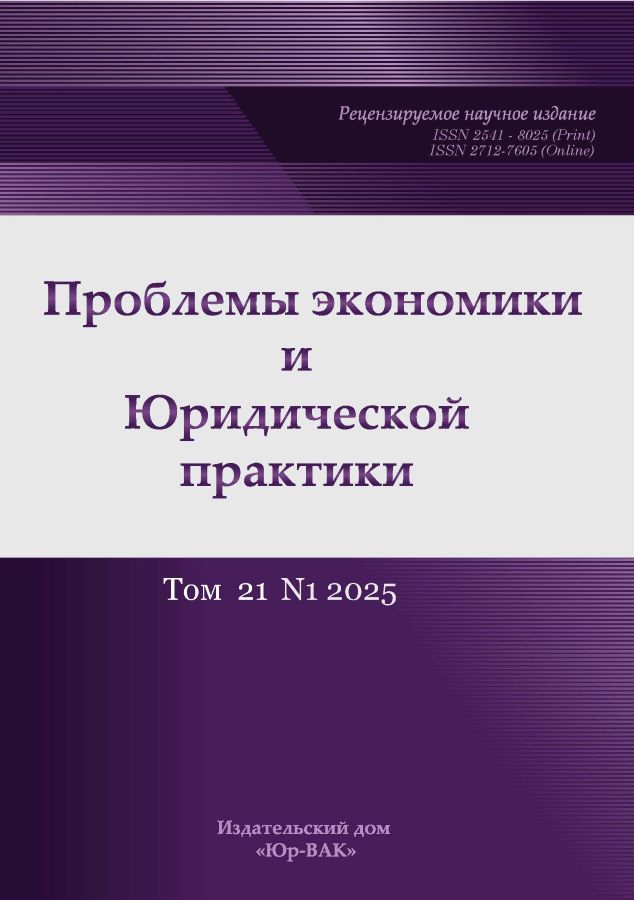Проблемы квалификации диверсий против объектов инфраструктуры связи
- Авторы: Мирный Д.С.1
-
Учреждения:
- Всероссийский государственный университет юстиции
- Выпуск: Том 21, № 1 (2025)
- Страницы: 148-153
- Раздел: Уголовно-правовые науки
- URL: https://journals.eco-vector.com/2541-8025/article/view/678488
- EDN: https://elibrary.ru/KWOVHU
- ID: 678488
Цитировать
Полный текст
Аннотация
В период специальной военной операции и напряжённой геополитической обстановки на территории Российской Федерации участились случаи диверсий, совершаемых в отношении элементов инфраструктуры электросвязи (телеком-инфраструктуры) — линий и сооружений связи, а также средств связи, включая базовые станции подвижной радиотелефонной («мобильной») связи. Анализ складывающейся правоприменительной практики демонстрирует ряд трудностей, с которыми сталкиваются правоохранительные органы и суды при квалификации подобных деяний. Обратить внимание следует, в частности, на затруднения в разграничении преступлений, предусмотренных ст.ст. 205 и 281 УК РФ, а также на необходимость корректного установления и описания предмета посягательства. С учётом изложенного в статье рассматриваются отдельные проблемные вопросы квалификации указанного рода преступлений, включая определение объекта, объективной стороны, целевой направленности деяния. По результатам анализа наиболее распространённых предметов посягательства предлагается также внести соответствующие уточнения в диспозицию ст. 281 УК РФ, направленные на корректное отражение сущности таких предметов.
Ключевые слова
Полный текст
Об авторах
Даниил Сергеевич Мирный
Всероссийский государственный университет юстиции
Автор, ответственный за переписку.
Email: 79260558027@yandex.ru
SPIN-код: 7110-8402
аспирант кафедры уголовного права и криминологии
Россия, МоскваСписок литературы
- Чупрова А.Ю. Транснациональная экономическая преступность: вопросы противодействия // Бизнес в законе. 2009. № 1. С. 147–150.
- Восканян Р.О. Роль цифрового образования в обеспечении экономического роста // Азимут научных исследований: экономика и управление. 2021. № 2. С. 136–139.
- Ванин В.В., Карпенко Г.М. Угроза экономической безопасности Российской Федерации как юридическая категория // Безопасность бизнеса. 2023. № 4. С. 21–26.
- Гирько С.И. Современный вектор развития Концепции общественной безопасности Российской Федерации // Административное право и процесс. 2020. № 8. С. 26–30.
- Куликов А.В. Диверсия как опаснейшее преступление современности: проблемы разграничения с террористическим актом // Право, экономика и управление: теория и практика. Материалы IV Всероссийской научно-практической конференции. Чебоксары, 2022. С. 95–98.
- Кудрявцев В.Н. Общая теория квалификации преступлений. — М.: Юридическая литература, 1972. С. 153.
- Серебренникова А.В., Лебедев М.В. Уголовно-правовая характеристика террористического акта // Актуальные проблемы российского права. 2020. № 2. С. 133–140.
- Ващенко Т.В. Стратегический финансовый менеджмент. — М.: Проспект, 2024. — 176 с.
- Багмет А.М., Бычков В.В. Квалификация преступлений террористического характера. — М.: ЮНИТИ-ДАНА, 2018. — 167 с.
- Томасси У. Электронные системы связи. — М.: Техносфера, 2016. — 1358 с.
Дополнительные файлы









